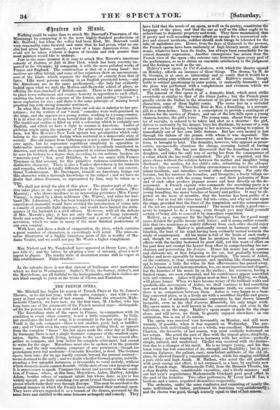COratrts nuti Zustr.
Nothing could be easier than to attack Mr. Banvard's Panorama of the Mississippi by comparing it to the more highly-finished productions of Mr. Burford; but when the volley had been fired, Mr. Banvard could very reasonably come forward and state that he had given, what no one else had given before, namely, a view of a large American river, that could not be taken without a degree of trouble and risk greater than most painters would like to undergo. Just in the same manner it is easy to attack Mrs. Mowatt's American comedy of Fashion, or .Life in New York, which has been recently im- ported at the Olympic, by comparing it with the more polished works of France and England. The construction is that of a young hand : her motives are often trivial, and some of her repartees show an unconscious- ness of the limits which separate the dialogue of comedy from that of farce. hie most persons residing in an English provincial town,—and the Americans are in the same predicament, —the lady has' evidently looked upon what we style the Morton-and-Reynolds school of plays, as offering the true standard of British comedy. There is the same tendency to place town refinement and country honesty in opposition to each other, exalting the latter at the expense of the former, and making " fashion " a mere euphuism for vice ; and there is the same principle of mixing broad practical fun with strong domestic sentiment.
In what Mrs. Mowatt has taken from our soil she is inferior to her pro- totypes • for the writers of our " stock " comedies were well-practised in the stage, and she appears as a young writer, working in a young country. It is in what she gives us from herself that the value of her play consists. The traditional outline is filled up with a colouring which is certainly not English, and which we have a right to assume is American. Ladies of plebeian origin aping the manners of the aristocracy are common enough here, but Mrs. Mowates New York upstart has peculiarities which only belong to the aristocratic feeling when nurtured in a democratic state of society. Her old fanner from Cattemugus is not a mere Fanner Ashfield over again, but he represents republican simplicity in opposition to fashionable innovation,—an opposition which is peculhuly manifested in America, and which often finds its exponent in serious tumults. Perhaps he uses his hickory to a degree that, according to our notions, borders on " mauvais gout" ; but, good Britisher, be not too angry with Farmer Trueman on that account, for this primitive rudeness contributes to his distinctive character. There is also a Yankee shrewdness in his manners and remarks, which is totally different from the 'cuteness of our conven- tional Yorkshireman. Mr. Davenport, himself an American, brings out this character with a thorough knowledge of his subject ; and we have no doubt that Alum Trueman, as represented by him, may be taken as a tY"Vie shall not detail the plot of this piece. The greater part of the ac- tion takes place in the superb apartments of the lady of fashion (Mrs. Marston) ; who shows insolence to an interesting governess (Miss Fanny Vining), is duped by a sham nobleman (Mr. Wigan), and ruins her hus- band (Mr. Johnstone), who has been tempted to commit a forgery. A more experienced dramatist would have avoided the introduction of crime into a comedy of generally light character, and would have limited the delin- quency of the husband to a civil offence. However, with all the defects of Mrs. Mowatt's play, it has not only the merit of being extremely lively and actable, but displays a geniality and a power of original ob- servation, which we miss in many of the more finished productions of our own country.
With here and there a fault of exaggeration, the piece, which contains a great number of characters, is exceedingly well acted. The mise-en- scene illustrative of a highly luxurious mode of life is worthy of Ma- dame Vestris, and we could not pay Mr. Watts a higher compliment.


























 Previous page
Previous page